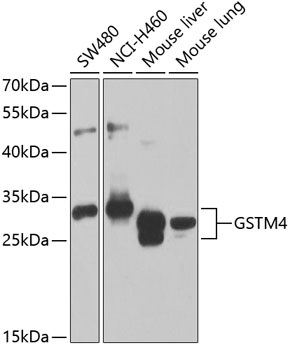Anti-GSTM4 Antibody (CAB7434)
- SKU:
- CAB7434
- Product type:
- Antibody
- Reactivity:
- Human
- Reactivity:
- Mouse
- Host Species:
- Rabbit
- Isotype:
- IgG
- Antibody Type:
- Polyclonal Antibody
- Research Area:
- Cell Biology
Frequently bought together:
Description
| 抗体名: | Anti-GSTM4 Antibody |
| 抗体コード: | CAB7434 |
| 抗体サイズ: | 20uL, 50uL, 100uL |
| 申し込み: | WB |
| 反応性: | Human, Mouse |
| 宿主種: | Rabbit |
| 免疫原: | Recombinant fusion protein containing a sequence corresponding to amino acids 1-218 of human GSTM4 (NP_000841.1). |
| 申し込み: | WB |
| 推奨希釈: | WB 1:500 - 1:2000 |
| 反応性: | Human, Mouse |
| ポジティブサンプル: | SW480, NCI-H460, Mouse liver, Mouse lung |
| 免疫原: | Recombinant fusion protein containing a sequence corresponding to amino acids 1-218 of human GSTM4 (NP_000841.1). |
| 精製方法: | Affinity purification |
| ストレージバッファ: | Store at -20'C. Avoid freeze / thaw cycles. Buffer: PBS with 0.02% sodium azide, 50% glycerol, pH7.3. |
| アイソタイプ: | IgG |
| 順序: | MSMT LGYW DIRG LAHA IRLL LEYT DSSY EEKK YTMG DAPD YDRS QWLN EKFK LGLD FPNL PYLI DGAH KITQ SNAI LCYI ARKH NLCG ETEE EKIR VDIL ENQA MDVS NQLA RVCY SPDF EKLK PEYL EELP TMMQ HFSQ FLGK RPWF VGDK ITFV DFLA YDVL DLHR IFEP NCLD AFPN LKDF ISRF EGLE KISA YMKS SRFL PKPL YTRV AVWG NK |
| 遺伝子ID: | 2948 |
| Uniprot: | Q03013 |
| セルラーロケーション: | Cytoplasm |
| 計算された分子量: | 18kDa/22kDa/25kDa |
| 観察された分子量: | 26-34kDa |
| 同義語: | GSTM4, GSTM4-4, GTM4 |
| バックグラウンド: | Cytosolic and membrane-bound forms of glutathione S-transferase are encoded by two distinct supergene families. At present, eight distinct classes of the soluble cytoplasmic mammalian glutathione S-transferases have been identified: alpha, kappa, mu, omega, pi, sigma, theta and zeta. This gene encodes a glutathione S-transferase that belongs to the mu class. The mu class of enzymes functions in the detoxification of electrophilic compounds, including carcinogens, therapeutic drugs, environmental toxins and products of oxidative stress, by conjugation with glutathione. The genes encoding the mu class of enzymes are organized in a gene cluster on chromosome 1p13.3 and are known to be highly polymorphic. These genetic variations can change an individual's susceptibility to carcinogens and toxins as well as affect the toxicity and efficacy of certain drugs. Diversification of these genes has occurred in regions encoding substrate-binding domains, as well as in tissue expression patterns, to accommodate an increasing number of foreign compounds. Multiple transcript variants, each encoding a distinct protein isoform, have been identified. |
| UniProt Protein Function: | GSTM4: Conjugation of reduced glutathione to a wide number of exogenous and endogenous hydrophobic electrophiles. Active on 1- chloro-2,4-dinitrobenzene. Belongs to the GST superfamily. Mu family. 2 isoforms of the human protein are produced by alternative splicing. |
| UniProt Protein Details: | Protein type:Transferase; Xenobiotic Metabolism - drug metabolism - cytochrome P450; EC 2.5.1.18; Xenobiotic Metabolism - metabolism by cytochrome P450; Other Amino Acids Metabolism - glutathione Chromosomal Location of Human Ortholog: 1p13.3 Cellular Component: cytoplasm; cytosol Molecular Function:enzyme binding; glutathione binding; glutathione transferase activity; protein binding; protein homodimerization activity Biological Process: glutathione metabolic process; xenobiotic catabolic process |
| NCBI Summary: | Cytosolic and membrane-bound forms of glutathione S-transferase are encoded by two distinct supergene families. At present, eight distinct classes of the soluble cytoplasmic mammalian glutathione S-transferases have been identified: alpha, kappa, mu, omega, pi, sigma, theta and zeta. This gene encodes a glutathione S-transferase that belongs to the mu class. The mu class of enzymes functions in the detoxification of electrophilic compounds, including carcinogens, therapeutic drugs, environmental toxins and products of oxidative stress, by conjugation with glutathione. The genes encoding the mu class of enzymes are organized in a gene cluster on chromosome 1p13.3 and are known to be highly polymorphic. These genetic variations can change an individual's susceptibility to carcinogens and toxins as well as affect the toxicity and efficacy of certain drugs. Diversification of these genes has occurred in regions encoding substrate-binding domains, as well as in tissue expression patterns, to accommodate an increasing number of foreign compounds. Multiple transcript variants, each encoding a distinct protein isoform, have been identified. [provided by RefSeq, Jul 2008] |
| UniProt Code: | Q03013 |
| NCBI GenInfo Identifier: | 1170096 |
| NCBI Gene ID: | 2948 |
| NCBI Accession: | Q03013.3 |
| UniProt Secondary Accession: | Q03013,Q05465, Q32NC1, Q4JNT8, Q6FH87, A8K765, |
| UniProt Related Accession: | Q03013 |
| Molecular Weight: | 18,627 Da |
| NCBI Full Name: | Glutathione S-transferase Mu 4 |
| NCBI Synonym Full Names: | glutathione S-transferase mu 4 |
| NCBI Official Symbol: | GSTM4 |
| NCBI Official Synonym Symbols: | GTM4; GSTM4-4 |
| NCBI Protein Information: | glutathione S-transferase Mu 4 |
| UniProt Protein Name: | Glutathione S-transferase Mu 4 |
| UniProt Synonym Protein Names: | GST class-mu 4; GST-Mu2; GSTM4-4 |
| Protein Family: | Glutathione S-transferase |
| UniProt Gene Name: | GSTM4 |
| UniProt Entry Name: | GSTM4_HUMAN |


